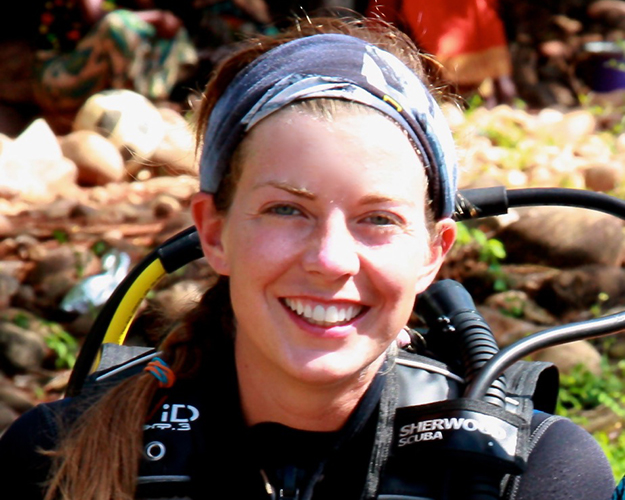Connie O’Connor joins elite company with Alice Wilson Award

Swimming with the fishes. Connie O'Connor pauses for a photo near Lake Tanganyika in Zambia, one of the African Great Lakes. The 2013 Alice Wilson Award winner spent two months in the east African nation earlier this year, researching the social behaviour of cichlid fish.
What can a small African fish tell us about the everyday social interactions of vertebrates? A lot more than we thought.
McMaster researcher and postdoctoral fellow Connie O’Connor has received a 2013 Alice Wilson Award thanks to her advanced research involving cichlid fish unique to east Africa’s expansive Lake Tanganyika.
The award recognizes three women of “outstanding academic qualifications” who are beginning a career in academia at the postdoctoral level, and is presented by the Academy of Science of the Royal Society of Canada.
“I was actually sitting at my desk here at McMaster when I first heard the news,” said O’Connor, who originally hails from the Kingston area. “It’s a tremendous honour, and it’s certainly very humbling to be chosen.”
Under the direction of Sigal Balshine, a professor in the Department of Psychology, Neuroscience & Behaviour, O’Connor has spent the past two years studying the genetic makeup and social habits of cichlid fish. Her recent work has zeroed-in on the evolution of social behaviour in the freshwater African fish, and on a larger scale, how changes in behaviour are being influenced by changing environmental factors.
One of the key behavioural traits she’s uncovered is that cichlids who live in groups are keen to resolve conflicts as quickly and effectively as possible. Individual fish will exhibit dominant and submissive behaviour in order to keep the peace and avoid fighting in a community. In other words, they act with the greater good in mind.
Other cichlids who live a more solitary existence tend to fight each other until one fish is driven off. “They don’t make up after fighting,” she explained.
O’Connor’s findings could have a big impact on the study of other vertebrate species and their social interactions, including various reptiles, amphibians and birds.
Her work in McMaster’s Department of Psychology, Neuroscience & Behaviour is an extension of a PhD project at Carleton University that involved studying the various stress factors that impact fish behaviour, including: dealing with man-made obstructions such as dams, increased pollution and being caught and released.
Working in Balshine’s lab for the past two years has proven to be a fruitful experience.
“Sigal is great. She already had the research program in place, and I’ve just carved out my own little niche. The department is a very social environment, and it’s a true intellectual community. I love being involved with so many people who are smart and motivated.”
The 30-year-old will receive her award during a ceremony in Banff, Alberta on Nov. 16, along with 84 newly elected Fellows of the Royal Society of Canada.
“This award is obviously a feather in Connie’s cap, but it’s also something McMaster can boast about,” added Balshine.
O’Connor is no stranger to major awards. In 2011, she received the E.B. Eastburn Postdoctoral Fellowship — widely regarded as one of the country’s top research fellowships. The award provided $80,000 to fund O’Connor’s cichlid research.
The Alice Wilson Award was established in 1991 to honour the memory of Alice Evelyn Wilson (1881-1964), a world-renowned palaeontologist and the first woman elected to the Royal Society of Canada (1938).

